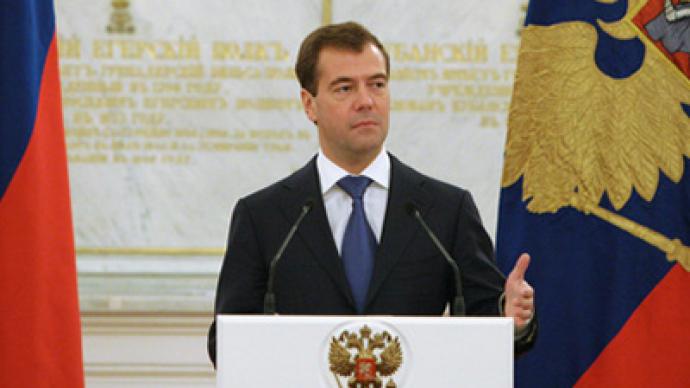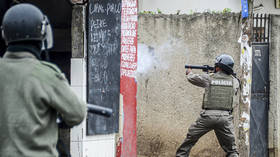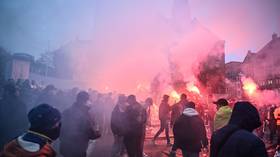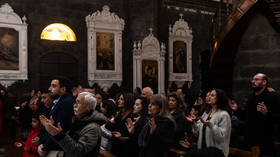People's consent is crucial to Medvedev

Gleb Pavlovsky, president of the Effective Politics Foundation, tells us what he believes the president meant by suggesting that the degree of political competition needs to be raised.
In his last videoblog, President Dmitry Medvedev outlined his vision of the problems democracy is facing in Russia. He explained what is being changed and what the authorities and the people need to do to avoid another period of stagnation. He urged the ruling party not to become “bronzed” and warned the opposition against becoming marginal.Gleb Pavlovsky, one of Russia’s leading and most influential political analysts and political philosophers, explains the dangers of stagnation in the political system and of the marginalization of the opposition.A dissident in the Soviet period, Gleb Pavlovsky established one of the biggest think tanks in post-Soviet time, which has to its credit 20 years of large-scale research, publishing and consulting.RT: President Medvedev has more than once spoken on democracy in Russia, its importance and its shortage. In what way, would you say, democracy in Russia is different from Western democracy?Gleb Pavlovsky: For the past 20 years, democracy was present in Russia mostly as a goodwill declaration by the elites, which acted mostly undemocratically. But what’s important is that there is still a consensus on the idea that nation-building should be carried out on a democratic foundation. That’s why none of the forces which openly proclaimed their intention to abolish rights and freedoms made it into mainstream politics during Yeltsin’s or Putin’s presidency. Even the Communists supported basic rights and freedoms. But I should mention that democracy was often interpreted illiberally and all crucial reforms were dictated from the top, without public discussion. As a result, the very term “democrat” became unpopular after the early 1990s. Today, it is mostly pro-Western populists who call themselves democrats.RT: Why do you think democracy in Russia is different from Western democracy?GP: It’s different from Western democracy because Russia is different from the West. Whenever democracy is built in any country, in any part of the world, this always involves special circumstances and different agendas. Nation-building always runs into its main difficulty and either overcomes it or not. In some cases, this may be religious division or a racial problem, as in the United States in the 19th century; in other cases, this may be social confrontation. Theorists call such challenges to democracy “deep divides.” In working on these deep divides, the distinctive characteristics of each model are produced.RT: So what problems does Russia face in building its democracy?GP: Russia was not established as a nation. The process of nation-building was not completed before the 1917 revolution or before 1991. Any democracy in Russia had to complete this nation-building in one way or another. Strictly speaking, a democratic society may emerge only after the process of nation-building has been completed. Yeltsin declared a national democratic state in Russia but he only made Russia’s deep divides even deeper. Putin produced a young middle class for this state. Medvedev intends to implement the nominally declared legal institutions. If he succeeds, nation-building will be finally completed in Russia.RT: Are you talking about building a nation in the political sense of the word?GP: That’s the only sense there is. There is an ethnic group, and there is a nation. Nation is a political term, or even a constitutional term. Of course, a nation has ethnic, cultural, language and historical parameters. Over the past few decades, Europe tried to strip the concept of nation of all ethnic characteristics, but that is impossible, just like it is impossible to build a nation on a “purely ethnic” ground. “Russians” is not an ethnic term, and Russian political culture is not limited by ethnic boundaries.RT: In addition to criticizing the current situation, Medvedev promises perpetual reforms in his statement.GP: I think you are misquoting him. He said that the reforms should be progressive, step-by-step.RT: He said, literally, that political reforms should be “gradual but steady.” What does that mean if not perpetual?GP: People’s consent is crucial to Medvedev at each stage of the reforms. That’s why he says they should be gradual. Karl Popper, one of the spiritual gurus of Medvedev’s political philosophy, called this strategy “piecemeal reform.” Russian intellectuals described it with a derogatory term, “small deeds strategy,” meaning modest steps in the right direction. But what Medvedev is talking about is not perpetual catastrophic reforms like the ones we saw in the 1990s. He is talking about reforms accompanied by discussion of their concept, a democratic consensus and civil peace. In other words, these are reforms which don’t divide our society further. Our society has already suffered serious traumas.RT: What does the president mean by “raising the degree of political competition”? Whom does he address with such a proposal?GP: This is definitely Medvedev’s recommendation to the ruling class, of which on the whole he says some rather harsh words. In fact, Medvedev’s attitude towards the ruling elites has always been special. I think it’s different from Putin’s. President Putin didn’t like the word “elite.” He didn’t like the word and always used it in quotation marks, “the so-called elites.” On the other hand, in reality it was the elites that Putin relied on, the elites as they were. As long as they didn’t challenge him, he didn’t try to change anything. He kept the ruling class on its toes, balancing between them and common people and acting as the defender of each party from the other one. When dealing with the political class, he acted as their defender from the masses; when addressing common people, he spoke as a brilliant charismatic leader, and because of him voters were ready to forgive the elites for their corruption. But the gap between the classes remained.President Medvedev is different. Medvedev wants to achieve an important objective: he wants the nation to trust its ruling class. Strictly speaking, the term “elite” by definition implies that such trust is in place. An elite is not really an elite if it’s not trusted. To achieve this objective, a qualitative change is necessary. Dmitry Medvedev expects not only more competition from the ruling class; he wants more legal culture and constitutional responsibility. Fair competition and fair play will restore people’s trust in those who rule over them.RT: The president suggests raising the level of popular representation. What does this mean? Is he preparing changes in the electoral system?GP: The problem here is very simple. Our political system co-exists with a vast number of people unrepresented in it. In the 1990s, this was because all political parties except for the Communists were Moscow clubs without regional branches. During Putin’s and Medvedev’s era, the emphasis was on establishing solid parties with solid regional networks. Then another problem emerged – parliamentary parties became a sort of oligarchy, and all those who don’t vote for them are left out. Those parties are getting stronger and stronger. At the same time, millions of voters are left out. They either don’t vote for them or don’t see any forces on the ballot for which they would like to vote. For example, socialist democratic forces and rightist liberals failed to create strong parties. The oligarchy of parliamentary parties is the problem of the models which are sometimes called “one-and-a-half-party systems,” where there is a ruling party and “small potatoes” who can’t get over the threshold and make it into the parliament. This is an inevitable defect of the Russian model of democratic transition; this is the price of our type of model. West Germany faced the same situation in the 1950s. We can also mention Japan, Mexico or Italy during the same period – but not as an excuse. So Medvedev wants to find additional measures, additional solutions, to improve representation. That’s why there is now guaranteed representation for smaller parties which got over five per cent yet didn’t get seven per cent. This is a kind of “exercise”: on the one hand, this helps smaller parties stay “fit” lest they lose hope and get even weaker; on the other hand, this stimulates bigger parties to stay competitive. They need some underdogs to keep them on their toes. Sooner or later, United Russia will have to lose the majority and start looking for allies in order to form a coalition. It’s important to prepare United Russia for this, so this doesn’t look like a disaster to them. This “fitness program” has been working for only two years but it seems that Medvedev plans to continue in the same vein.
RT: Why did Medvedev use the word “stagnation”? It seems that there is no consensus on the Brezhnev period and the terms used to describe it. This word has already divided our society once. So, what was the need to use it now?GP: This term has existed in the Russian language for 200 years. It was first used to describe the rule of Alexander I. The meaning of this political term is clear to us without additional explanations from the Gorbachev era. This is the kind of stagnation that undermines our ability to overcome it and return to development. It’s more than just a slowdown; it involves signs of degradation. The opposition withdraws from politics; like Medvedev said, it loses the hope to win the only prize that counts in politics – power, or a share of power. The ruling party, too, loses form. This overall lack of competition is what we call stagnation. Stagnation is the opposite of progress and Medvedev is definitely a progressionist.I think the president is also angry about the way the political class responded to his modernization program. Basically, they ignored Medvedev’s idea. They sabotage Medvedev’s plan without having their own and without opposing him openly.In Medvedev’s opinion, our political experience precludes another period of stagnation. Stagnation results in the political class and all the groups associated with it losing legitimacy in the eyes of voters. People no longer trust it, and the entire system of government falls to pieces. Medvedev is determined to prevent its collapse. Despite what some people say, Medvedev is no Gorbachev and no Yeltsin. He doesn’t view the collapse of the state as the price of personal domination. Medvedev wants to be the leader of this political system, but in its modernized form, and of its legitimate ruling class, which would be competitive on the international arena. That’s why he is already criticizing it rather harshly, and he is going to take further steps in that direction.RT: If the opposition becomes marginal, how can you make it not marginal? And why would you do that?GP: In order not to be marginal, the political opposition must have the prospect of influencing the authorities directly through elections and the prospect of coming to power. It must exert influence, both through public campaigns on the internet and outside it. It has the right to promote its slogans, concepts and programs. Otherwise, the opposition has no reason to be loyal to the system, and then it becomes tolerant towards extremists. Citizens without representation start to feel as if they don’t belong in the system. This promotes extremism, extremist forms of parties. We can see this today, with liberal intellectuals supporting semi-fascist Limonov.RT: Is this statement by the president a preamble to his state-of-the-nation address in your view? Or is it something more important?GP: This is part of Medvedev’s political autumn offensive, if you will, which started at the Yaroslavl political forum in September and will obviously continue in his state-of-the-nation address. The social message of modernization is getting stronger. Medvedev comes to the masses and explains to them the benefits of an updated economy and state. The political season of 2010-2011 is the last season before the election. Medvedev is clearly pursuing his strategy: he will put more and more pressure on the elites, on the executive branch, including the cabinet, and on regional authorities, to make them recognize him as the natural leader of the political class. This recognition is growing by the day, especially at the regional level, in industrial and administrative circles and even among security officials. The president is convinced that nobody in the country can offer an alternative to his policy, and he intends to make people recognize him as the natural candidate for presidency. He wants everybody to recognize him voluntarily and, what is especially important, he wants Putin to agree to this.
Nadezhda Kevorkova, RT












